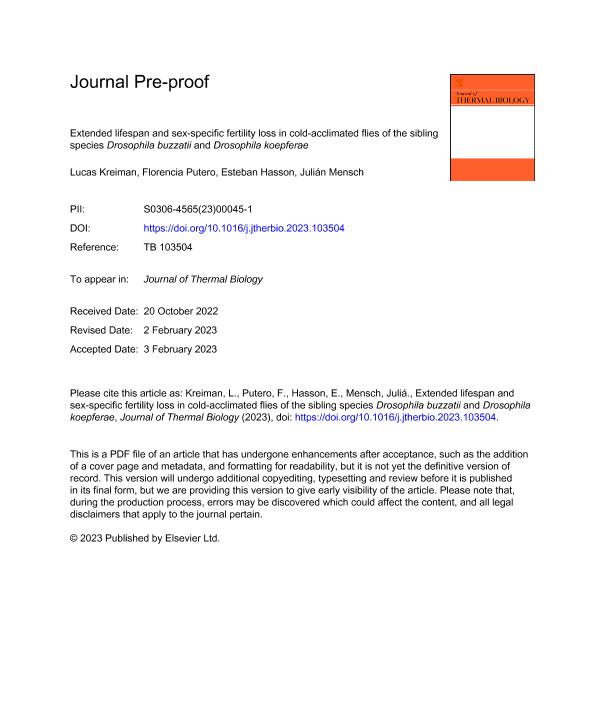Mostrar el registro sencillo del ítem
dc.contributor.author
Kreiman, Lucas Eli

dc.contributor.author
Putero, Florencia Aldana

dc.contributor.author
Hasson, Esteban Ruben

dc.contributor.author
Mensch, Julian

dc.date.available
2023-12-14T11:32:57Z
dc.date.issued
2023-02
dc.identifier.citation
Kreiman, Lucas Eli; Putero, Florencia Aldana; Hasson, Esteban Ruben; Mensch, Julian; Extended lifespan and sex-specific fertility loss in cold-acclimated flies of the sibling species Drosophila buzzatii and Drosophila koepferae; Pergamon-Elsevier Science Ltd; Journal of Thermal Biology; 113; 2-2023; 1-8
dc.identifier.issn
0306-4565
dc.identifier.uri
http://hdl.handle.net/11336/220275
dc.description.abstract
Survival and reproduction are the core elements of Darwinian fitness. In the context of a fixed energy budget, organisms tend to allocate resources in order to maximize one at the expense of the other, in what has been called the lifespan-reproduction trade-off. Reproductive arrest and extended lifespan are common responses to low temperatures in many insects including fruit flies. In this study, we aim to understand the overwintering strategy of two closely-related Drosophila species with contrasting distribution ranges. We compared survival, lifespan, ovarian maturation, and reproductive output (fecundity and fertility) of virgin and mated adults of both Drosophila buzzatii and Drosophila koepferae after long-term cold exposure at dormancy-inducing conditions (10 °C, 10:14 L:D) and controls (25 °C, 12:12 L:D). Virgin flies of D. buzzatii showed the longest lifespan (averaging 102 days) under dormancy-inducing conditions. Cold-induced reproductive arrest preserves reproductive capacity mainly in virgin females that mated after reproductive dormancy, indicating that males were much more susceptible to fertility loss than females, in both species. Notably, females of D. buzzatii were capable of protecting stored sperm from cold damage and produced viable progeny. Even if, in D. buzzatii, fertility of flies mated after the cold-exposure was extremely low, cold temperature likely sterilized D. koepferae males, indicating that cold carry-over effects are stronger for the species with the shorter lifespan. Such species-specific effects of low temperature over fitness likely contributed to the divergence of these closely-related species and to the spread of D. buzzatii into cooler environments.
dc.format
application/pdf
dc.language.iso
eng
dc.publisher
Pergamon-Elsevier Science Ltd

dc.rights
info:eu-repo/semantics/openAccess
dc.rights.uri
https://creativecommons.org/licenses/by-nc-sa/2.5/ar/
dc.subject
COLD ADAPTATION
dc.subject
FRUIT FLY
dc.subject
OVERWINTERING
dc.subject
REPRODUCTIVE DORMANCY
dc.subject.classification
Biología Reproductiva

dc.subject.classification
Ciencias Biológicas

dc.subject.classification
CIENCIAS NATURALES Y EXACTAS

dc.title
Extended lifespan and sex-specific fertility loss in cold-acclimated flies of the sibling species Drosophila buzzatii and Drosophila koepferae
dc.type
info:eu-repo/semantics/article
dc.type
info:ar-repo/semantics/artículo
dc.type
info:eu-repo/semantics/publishedVersion
dc.date.updated
2023-12-13T16:49:01Z
dc.journal.volume
113
dc.journal.pagination
1-8
dc.journal.pais
Estados Unidos

dc.description.fil
Fil: Kreiman, Lucas Eli. Consejo Nacional de Investigaciones Científicas y Técnicas. Oficina de Coordinación Administrativa Ciudad Universitaria. Instituto de Ecología, Genética y Evolución de Buenos Aires. Universidad de Buenos Aires. Facultad de Ciencias Exactas y Naturales. Instituto de Ecología, Genética y Evolución de Buenos Aires; Argentina
dc.description.fil
Fil: Putero, Florencia Aldana. Consejo Nacional de Investigaciones Científicas y Técnicas. Oficina de Coordinación Administrativa Ciudad Universitaria. Instituto de Biodiversidad y Biología Experimental y Aplicada. Universidad de Buenos Aires. Facultad de Ciencias Exactas y Naturales. Instituto de Biodiversidad y Biología Experimental y Aplicada; Argentina
dc.description.fil
Fil: Hasson, Esteban Ruben. Consejo Nacional de Investigaciones Científicas y Técnicas. Oficina de Coordinación Administrativa Ciudad Universitaria. Instituto de Ecología, Genética y Evolución de Buenos Aires. Universidad de Buenos Aires. Facultad de Ciencias Exactas y Naturales. Instituto de Ecología, Genética y Evolución de Buenos Aires; Argentina
dc.description.fil
Fil: Mensch, Julian. Consejo Nacional de Investigaciones Científicas y Técnicas. Oficina de Coordinación Administrativa Ciudad Universitaria. Instituto de Ecología, Genética y Evolución de Buenos Aires. Universidad de Buenos Aires. Facultad de Ciencias Exactas y Naturales. Instituto de Ecología, Genética y Evolución de Buenos Aires; Argentina
dc.journal.title
Journal of Thermal Biology

dc.relation.alternativeid
info:eu-repo/semantics/altIdentifier/doi/https://doi.org/10.1016/j.jtherbio.2023.103504
Archivos asociados
